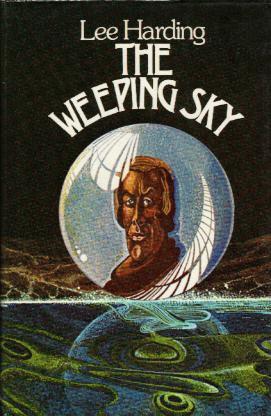
The Weeping Sky by Lee Harding, 1977
(Cassell Australia 1977 edition)
Cover illustration by Michael Payne

The Weeping Sky by Lee Harding, 1977
(Cassell Australia 1977 edition)
Cover illustration by Michael Payne
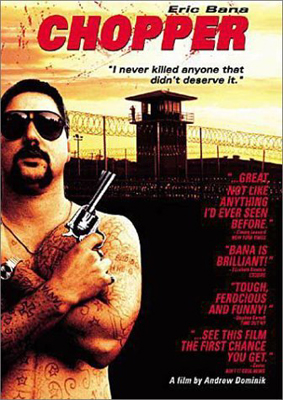
Chopper 2000
Directed by Andrew Dominick
Screenplay by Andrew Dominick from the books by Mark Brandon "Chopper" Read
Featuring Eric Bana, Vince Colosimo, Simon Lyndon, David Field, and Daniel Wyllie.
The sunburnt ---- stockman stood
And, in a dismal ---- mood,
Apostrophized his ---- cuddy;
"The ---- nag's no ---- good,
He couldn't earn his ---- food --
A regular ---- brumby,
----!"
He jumped across the ---- horse
And cantered off, of ---- course!
The roads were bad and ---- muddy;
Said he, "Well, spare me ---- days
The ---- Government's ---- ways
Are screamin' ---- funny,
----!"
He rode up hill, down ---- dale,
The wind it blew a ---- gale,
The creek was high and ---- floody.
Said he, "The ---- horse must swim,
The same for ---- me and him,
Is something ---- sickenin',
----!"
He plunged into the ---- creek,
The ---- horse was ---- weak,
The stockman's face a ---- study!
And though the ---- horse was drowned
The ---- rider reached the ground
Ejaculating, "----!"
"----!"
First published in The Bulletin, 11 December 1898
Note:
This poem was originally published under the title "----!" (The Great Australian Adjective).
The Hardy Novel
When Fate starts operating in Mr. Hardy's country he operates not so much with despatch as with efficiency.
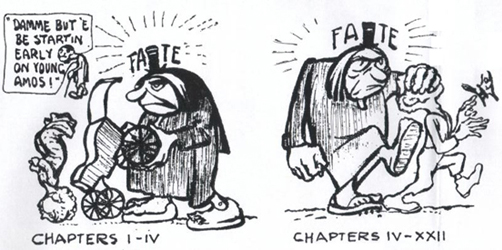
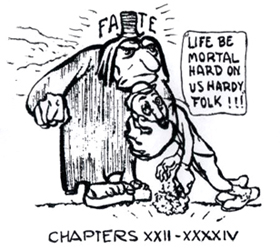
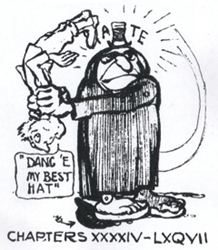
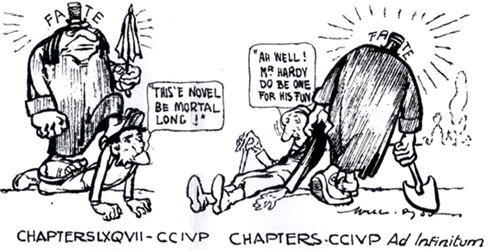
First published in The Herald, 22 May 1926
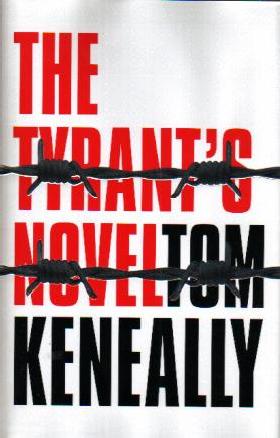
The Tyrant's Novel by Tom Keneally, 2003
(Doubleday 2003 edition)
Jacket design by DarianCausby/Highway 51
The shortlisted works for the 2006 Ned Kelly Awards (Australia's premier crime writing awards) have been announced. The nominees are:
Best Novel
Rendezvous at Kamakura Inn, Marshall Browne (Random House)
Saving Billy, Peter Corris (Allen & Unwin)
Crook as Rookwood, Chris Nyst (HarperColins)
Rubdown, Leigh Redhead (Allen & Unwin)
Five Oranges, Graham Reilly (Hachette Livre)
The Broken Shore, Peter Temple (Text Publishing)
First Novel
Head Shot, Jarad Henry (Thompson Walker)
Out of the Silence: A Story of Love , Betrayal, Politics and Murder, Wendy James (Random House)
Dead Set, Kel Robertson (Text Publishing)
True Crime
You'll Never Take Me Alive, Nick Bleszynski (Random House)
In Your Face, Rochelle Jackson (ABC Books)
Norfolk Island of Secrets, Tim Latham (Allen & Unwin)
Packing Death, Lachlan McCulloch (Sly Ink)
And Then the Darkness, Sue Williams (ABC Books)
The winners will be announced on August 30 during the Melbourne Writers' Festival.
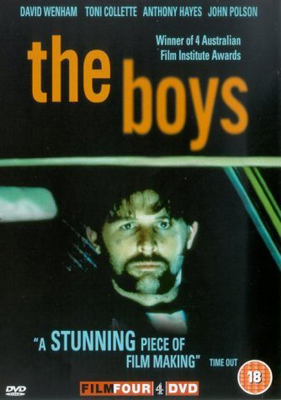
The Boys 1997
Directed by Rowan Woods
Screenplay by Stephen Sewell from the play by Gordon Graham
Featuring David Wenham, Toni Collette, Lynette Curran, John Polson, and Jeanette Cronin.
Things are going to get a little slow around here over the next few weeks. On Monday I'm off to the US to attend this year's World Science Fiction Convention, LACon IV, and will then be spending 2½ weeks on holiday with the family. I've set up a few postings that I can publish over that time, I'll keep an eye out for the various book awards that are due to be announced over the coming weeks, and I'll approve comments as they appear. But news items and detailed commentary is going to be thin on the ground. I'll be back on deck around September 14. Play nice till then.
Don't forget that the 2006 Hugo Awards will be announced at LACon, and among the nominees is Margo Lanagan for "Singing My Sister Down" in the Short Story category, while K.J. Bishop is nominated for the John W. Campbell Award for Best New Writer. Good luck to both of them. I'll be watching.
Mr John Masefield, the Poet Laurate, has accepted an invitation to visit Melbourne for the Centenary celebrations.
He comes as a man who has lived 'mid men
With the gloss and the polish off;
And truth flows free from his ready pen
For he looked on life with a keen eye then,
And he found small cause to scoff.
And he loved the sea and its ships of sail
And a sailor's way and a sailor's tale;
And he looked on the world at an epoch's close
And found what none but the venturer knows.
He comes as a poet that the gods adopt
With songs of the wild and the free
Shorn of the snivelling cadence dropped
From the lips of the sophist snugly propped
On the throne of a pink settee.
And he loves the land and the flowering wealds,
The west wind's song and the daffodil fields
As he loves the song of a howling gale
Caught in the cup of a bellying sail.
And what shall he say of us who comes here --
This man who has lived as a man?
He shall follow the way of the pioneer
And our own high venturers, blind to fear,
Who strove when the race began;
And the digger's way and the drover's way
And the rough, rude life of an olden day
And the track of the lonely Overland --
He shall follow them all -- and understand.
And his keen mind's eye shall pierce the gilt
That would cover the old, rough life:
He shall sense the soul of a young land built
In the days when life had a strong, rude lilt
And a rhythm tuned to strife.
He shall trace again in the Anzac's soul
The spirit that made this young land whole.
And so, as he sees, shall he blame or praise
By a standard won in the world's highways.
First published in The Herald, 11 April 1934
Australian playwright Alex Buzo has died after a long illness, he was 62. Born in Sydney in 1944, he was educated at The Armidale School, the International School in Geneva and the University of New South Wales from which he graduated BA in 1965. He came to national attention in 1968 with his play Norm and Ahmed, though he is probably best known for his plays Rooted (1969), The Front Room Boys (1969) and Coralie Lansdowne says No (1974). In addition to his plays he was the author of two novels (The Search for Harry Allway (1985) and Prue Flies North (1991)).
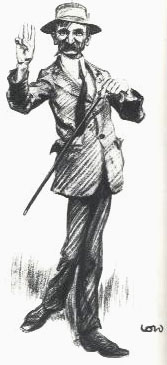 |
The shortlisted works for the 2006 Victorian Premier's Literary Awards were announced last Friday (11 August) and somehow I contrived to miss seeing the list before today. You can get full details of the award at the State Library of Victoria's website.
The shortlisted works are:
The Vance Palmer Prize for Fiction
Theft: A Love Story, Peter Carey [Knopf/Random House]
Slow Man, J. M. Coetzee [Knopf/Random House]
The Secret River, Kate Grenville [Text Publishing]
Everyman's Rules for Scientific Living, Carrie Tiffany [Picador/Pan Macmillan]
The Nettie Palmer Prize for Non-fiction
Aboriginal Australians: A History Since 1800, Richard Broome [Allen & Unwin]
Margaret Michaelis: Love, Loss and Photography, Helen Ennis [National Gallery of Australia]
Bernard Shaw: A Life, Anthony M. Gibbs [UNSW Press]
East of Time, Jacob G. Rosenberg [Brandl and Schlesinger}
Hoi Polloi, Craig Sherborne [Black Inc]
The C J Dennis Prize for Poetry
Universal Andalusia, Brett Dionysius [Soi 3/Papertiger Media]
The Kindly Ones, Susan Hampton [Five Islands Press]
Urban Myths: 210 Poems, John Tranter [University of Queensland Press]
The Louis Esson Prize for Drama
Checklist for an Armed Robber, Vanessa Bates [Vitalstatistix National Women's Theatre]
Ruby's Last Dollar, Reg Cribb [Pork Chop Productions]
Three Furies: Scenes from the Life of Francis Bacon, Stephen Sewell [Adelaide Festival]
The Prize for Young Adult Fiction
Theodora's Gift, Ursula Dubosarsky [Penguin]
The Slightly Bruised Glory of Cedar B. Hartley, Martine Murray [Allen & Unwin]
Losing It, Lizzie Wilcock [Scholastic Press]
The Prize for a First Book of History
Human Remains, Helen MacDonald [Melbourne University Press]
Botany Bay: Where Histories Meet, Maria Nugent [Allen & Unwin]
Traumascapes, Maria Tumarkin [Melbourne University Press]
The Alfred Deakin Prize for an Essay Advancing Public Debate
The Tortures of Heritage, Waleed Aly [The Age]
Relaxed and Comfortable: The Liberal Party's Australia, Judith Brett, 'Quarterly Essay', [Black Inc]
Is the Media Asleep?, David Marr from "Do Not Disturb: Is the Media Failing Australia?" [Black Inc]
The Village Roadshow Prize for Screen Writing
Suburban Mayhem, Alice Bell [Suburban Mayhem Pty Ltd]
Last Train to Freo, Reg Cribb [Taylor Media]
Noise, Matthew Saville [Retroactive Films]
The Prize for Indigenous Writing
Watershed, Fabienne Bayet-Charlton [IAD Press]
Sweet Guy, Jared Thomas [IAD Press]
Little Black Bastard, Noel Tovey [Hachette Livre Australia]
Swallow the Air, Tara June Winch [University of Queensland Press]
The Prize for an Unpublished Manuscript by an Emerging Victorian Writer
Aether, Kate Cole-Adams
Rohypnol, Andrew Hutchinson
Among the Dead, Chris Womersley
The Grollo Ruzzene Foundation Prize for Writing about Italians in Australia
When in Rome: Chasing La Dolce Vita, Penelope Green [Hachette Livre Australia]
The Olive Sisters, Amanda Hampson [Penguin]
From Tuscany to Victoria: The Life and Work of Pietro Baracchi, Carlo Catani, Ettore Checchi, Daniela Volpe [Italian Australia Institute]
The John Curtin Prize for Journalism
Information idol - How Google is Making Us Stupid, Gideon Haigh [The Monthly]
The Tall Man, Chloe Hooper [The Monthly]
Generation Lost in the Desert, Frontier Too Far and Scams in the Desert, Nicholas Rothwell [The Australian]
Ties That Bind, Margaret Simons [Griffith Review]
In 2006 the following awards will NOT be offered: The Prize for Science Writing and The Dinny O'Hearn Prize for Literary Translation.
The winners will be announced by the Victorian Premier on Monday 4 September.
Commentary on the 2006 longlist for the 2006 Man Booker Prize is starting to flow out now that people have had a day to digest it.
"The Age" leads, naturally enough, with the Australian angle, obtaining comments from both Carey and Grenville -- both voicing surprise that they actually made the list. To use a sporting analogy, they're "taking it one prize at a time".
"The Australian" also elicits a comment from Grenville, but uses that dreaded American term "threepeat" to indicate that Carey is up for his third prize.
In "The Sydney Morning Herald", Susan Wyndham covers the main Australian points but shifts focus by quoting Graham Sharpe of the William Hill bookmakers who says Mitchell "thoroughly deserves to win after being robbed with Cloud Atlas two years ago by Alan Hollinghurst's Line of Beauty". Which is more like it. He wuz robbed I tell ya, robbed.
Claire Armistead, in "The Guardian", leaves sport behind for a more alcoholic approach: "Like any good wine producer, the Booker has its vintage and non-vintage years. If last year's shortlist was premier cru, the previous two were best drunk young. On the strength of the 19 books on the latest longlist we are looking at a year that is respectable but not startling, which can expect to be served up at dinner parties across the literary world."
It's David vs Goliath in "The Daily Telegraph" as Nigel Reynolds seems delighted that Nadine Gordimer, at 82, is on the list. He also notes that Kiran Desai is the daughter of Anita Desai, a great writer, who was shortlisted for the prize three times in the 1980s and 1990s.
On the weblog front, the Literary Saloon isn't that impressed by the list: "None really seem prize-worthy to us, but the Carey and Mitchell are better than some of the titles that have taken this prize recently (including Carey's own True History of the Kelly Gang) -- though we also think Mitchell's three previous novels are better than this one is."
On the betting front, William Hill Bookmakers has Mitchell at 5/1, Carey and Waters at 7/1, Unsworth at 8/1 and Jacobson at 10/1.
Expect a lot more on this over the coming days/weeks.
The longlist for the 2006 Man booker prize has been announced. The list is:
Theft: A Love Story, Peter Carey
The Inheritance of Loss, Kiran Desai
Gathering the Water, Robert Edric
Get a Life, Nadine Gordimer
The Secret River, Kate Grenville
Carry Me Down, M.J. Hyland
Kalooki Nights, Howard Jacobson
Seven Lies, James Lasdun
The Other Side of the Bridge, Mary Lawson
So Many Ways to Begin, Jon McGregor
In the Country of Men, Hisham Matar
The Emperor's Children, Claire Messud
Black Swan Green, David Mitchell
The Perfect Man, Naeem Murr
Be Near Me, Andrew O'Hagan
The Testament of Gideon Mack, James Robertson
Mother's Milk, Edward St Aubyn
The Ruby in Her Navel, Barry Unsworth
The Night Watch, Sarah Waters
As usual there are a number of books that might have been expected to make the list but didn't. There are three past winners of the prize on the list in Carey, Gordimer and Unsworth, but there are also a lot of new names.
Three Australian authors have made this year's list: Carey, Grenville and Hyland. The last two of these are both published by Canongate in the UK - continuing that publisher's recent run of success with this award.
My guess is that it will be out of Carey, Mitchell and Waters, with Mitchell the favourite.
The shortlist will be announced on Thursday 14th September, and the winner on Tuesday 10th October.
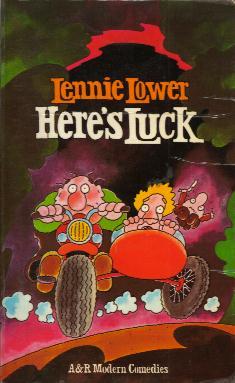
Here's Luck by Lennie Lower, 1930
(Angus & Robertson 1977 edition)
Cover illustration: Allan Stomann
The Age
You'd have to think that a book with a title like Paper Empires: A History of the Book in Australia 1946-2005 would be a rather dry old affair. But this volume, edited by Craig Munro and Robyn Sheahan-Bright, appears to have captivated Margaret Harris - described as professor in English literature at the University of Sydney, and a book tragic. "Yet the book is more than a treasure house of detail. Paper Empires is a gripping read. There are three sections - The Rise of Publishing, Book Business, and Reaching Readers - each with several chapters, and each chapter constituted by brief segments. Within this capacious overview many themes recur in different contexts and a set of narrative strands emerges."
William McInnes is best known as an actor who published a memoir of his father, A Man's Got to Have a Hobby, last year. Now he's published his first novel, and, according to Juliette Hughes, it's quite an amusing read. The trouble with books like this is the supposed content: it tends to put readers off who are just not interested in cricket - though I really can't see how that could possibly be the case. "There is a lot more than cricket going on in Cricket Kings. For one thing, McInnes, previously known for his acting, has that rare and precious talent of making the reader laugh out-loud. He reminds me a little of that old Aussie John O'Grady, but has a lighter, more ironic touch...It's a warm story of a man that most will recognise. For one thing, McInnes places his hero (Chris Andersen, the quiet, kind sort of hero), in a real place and time: Yarraville and now, on any one Saturday. He is a solicitor, a nice one who works for the unions. For Chris, getting a law degree hasn't meant moving across the Yarra and becoming a neocon. Cricket for him is about more than winning, sweet as that may be."
Short notices are given to: Somme Mud: The War Experiences of an Australian Infantryman in France 1916-1919 by E.P.F. Lynch: "Quaint Edwardian phrases aside, Lynch shows remarkable maturity in his ability to capture the banality of terror"; Overland: The New Australian Ugliness edited by Nathan Hollier, which deals with architecture in Australian suburbs, Ian Syson laments the loss of "confidence and bravado" in Australian literature and Lucy Sussex writes about Mary Fortune; Metro by Alasdair Duncan which "is the sort of young-adult fiction that teens and tweens will find instantly familiar because it speaks to them in their own voice, rather than a try-hard imitation of it"; The Messenger by Markus Zusak whihc has been republished for an adult fiction market: "Zusak writes with an unpretentious charm, and this funny and moving book -- with its black humour, narrative assurance and philosophical twist -- is one of those rare novels that will appeal equally to adults and teens"; Surfing Goliath by Michael Hyde whose "inclination to write for children about gangs and their big adventure is on the money"; and Filthy Rat by Simon Illingworth: the story of a whistleblower in the Victorian Police Force.
The Australian
As his new poetry collection, Urban Myths, is published, Rosemary Neill profiles John Trantor. The poet has a sly dig at Les Murray, reveals his battles with depression, laments the curent state of poetry publishing in this country, but also seems pleased at the response that Jacket, an online poetry publishing venture he helps edit, is getting around the world.
And continuing their look at book-people not usually covered by major newspapers, Jodie Minus interviews Robert Ingpen, who is currently providing illustrations for a new set of children's classics: The Jungle Book, Peter Pan and Treasure Island. "To illustrate stories that are familiar to generations and are designed to appeal to new readers, Ingpen employs cinematographic techniques, which are familiar to today's children, while also taking into account the period in which the story was written. His illustrations for Peter Pan and Treasure Island have a 'sort of furry woolliness and a feyness, which gives you a dating without making it look too old-fashioned'."
First novels abound with Kathy Hunt looking at Diamond Dove by Adrian Hyland ["His whodunit is a perfectly paced story"], and The Dark Part of Me by Belinda Burns, which the reviewer doesn't seem keen on at all.
Also on the debut side, Natasha Civa reviews The Unexpected Elements of Love by Kate Legge, and The Island of Four Rivers by Christopher Morgan: "Legge is an award-winning political journalist and senior writer for The Australian, so it is no surprise that her prose tends to be straighter, more literal. Her background also breaks through in some timely and spiky narrative references to questions of contemporary conscience, including global warming, reconciliation and the decline of family, social and environmental cohesion...The Island of Four Rivers is an out-of-the-box, lyrical fantasy that beautifully suspends adult disbelief...Despite symmetries of subject matter and a common underlying optimism, these novels (like families) really shouldn't be compared. They're distinctive beasts and promise to attract different camps of followers."
Short notices are given to: The History of Australian Corrections by Sean O'Toole who writes that "Much of the machinery of Australian society and government today has been profoundly shaped by its convict origins"; and More Mere Mortals: Further Historical Maladies and Medical Mysteries of the Rich and Famous by Jim Leavesley: "Moses stuttered...Michelangelo may have suffered Asperger's syndrome", you get the picture.
The Sydney Morning Herald
Gideon Haigh casts his critical eye over the new Shane Warne biography, Spun Out, by Paul Barry, and he doesn't seem too impressed: "It was [regarding the subject's number of sexual conquests] in Spun Out that I felt my scepticism hardening. Not about Warne, incorrigible and foolish as he is, but Barry, a journalist held in high professional esteem. Because in two paragraphs he had perpetrated two of the giveaways of lazy reporting: giving credence to a wild, unsourced innuendo on no evidence other than guesswork, then alleging a conspiracy of silence that he, righteous man, nobly scorned...Spun Out proves a rare hatchet job where the biographer comes off worse than his subject. At least Warne hasn't squandered his talent so utterly as Barry has here." Showing that Gideon Haigh has a talent for producing the unplayable delivery as well.
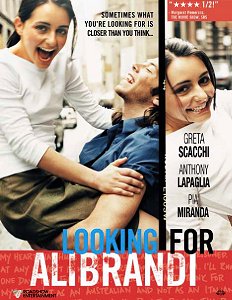
Looking for Alibrandi 2000
Directed by Kate Woods
Screenplay by Melina Marchetta from her own novel
Featuring Elena Cotta, Anthony LaPaglia, Greta Scacchi, and Kerry Walker
"The chief fault of recent Australian verse lies in its extreme simplicity; it does not go deep enough." - Chorus of British rags.
They have scoffed at us in England, where the poet's hair is long,
And have crawled a dread "too simple" through the stanzas of our song;
They have said that we are shallow, that we sink no deep song-mines --
There's a sorry lack of culchaw in our easy-flowing lines!
And we do not boost Britannia with our poems and our pens,
Hence come these deep reproaches from the land of beef and fens.
We're a Simple (shout it!) People, and we want no gaudy song,
So we write our verse to suit us, and, says Hingland, it is wrong.
We should learn a style didactic; we should Chadbandise our verse;
Till it ambled past the eyesight like a smug, corpse-laden hearse.
We should yell for Blood and Boodle; we should howl for Grab and Gore;
Then those papers all would praise us and would say we "simped" no more!
If we screeched for Brass and Battle we would be more popular
In the land where Judas reigneth and the fogs and paupers are.
If we lauded King and Courtier -- if we crawled like worms along,
There'd be tears of joy in Fleet-street and a boom in Austral song.
Every bard would get the order of the Clothes Prop or the Bath;
They would knight friend Victor Daley with a paling or a lath.
They would chase each wayback rhymer with a starry C.M.G.,
And THE TIMES would print our poems if we praised Bull constantlee!
But we cannot yell for Hempire and we cannot howl for Blood --
We object to Kings, and Courtiers like Batrachians in the mud.
Even though the mud be Royal, we object to crawling through,
To the throne of august Edward and the kiss-goal of his shoe.
We object to Judas Joseph, and till Daley's hair grows long,
We shall raise grey grief in Fleet-street with our beastly Simple Song!
First published in The Bulletin, 20 August 1903
About a month back "The Australian" newspaper submitted a chapter of a Patrick White novel to a number of Australian publishers under the name Wraith Picket. It was roundly rejected by all of them - exactly what the paper hoped to achieve. This hoax was reported all over the place and I thought about commenting on it but got bored by the whole affair pretty quickly. And I didn't think I had anything to add. It had been done before in the UK with a chapter from a novel by V.S. Naipaul, and that exercise had been trawled over by everyone at the time.
Now, just as we thought the whole imbroglio seemed about to settle down, "The Australian" has lobbed another grenade into the mess. I'm not so interested in what the article has to say so much as the fact that they spend a lot of time quoting from one particular literary weblog. I think this is the first time I've seen a major paper in Australia do this.
Just thought you might be interested.
As an amusing addendum to all this, the number of readers in Sydney have set up a Patrick White Readers' Group with its own weblog. The aim is to get people reading the old curmudgeon again. And that can only be a good thing.
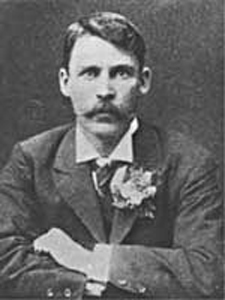
Will Ogilvie (1869 - 1963)
Store cattle from Nelanjie! The mob goes feeding past,
With half a mile of sandhill 'twixt the leaders and the last;
The nags that move behind them are the good old Queensland stamp --
Short backs and perfect shoulders that are priceless on a camp;
And these are Men that ride them, broad chested, tanned and tall,
The bravest hearts amongst us and the lightest hands of all:
Oh, let them wade in Wonga grass and taste the Wonga dew,
And let them spread, those thousand head -- for we've been droving too!
Store cattle from Nelanjie! By half-a-hundred towns,
By Northern ranges rough and red, by rolling open downs,
By stock-routes brown and burnt and bare, by flood-wrapped river-bends,
They've hunted them from gate to gate -- the drover has no friends!
But idly they may ride to-day beneath the scorching sun
And let the hungry bullocks try the grass on Wonga run;
No overseer will dog them here to "see the cattle through,"
But they may spread their thousand head -- for we've been droving too!
Store cattle from Nelanjie! They've a naked track to steer;
The stockyards at Wodonga are a long way down from here;
The creeks won't run till God knows when, and half the holes are dry;
The tanks are few and far between and water's dear to buy:
There's plenty at the Brolga bore for all his stock and mine --
We'll pass him with a brave God-speed across the Border line;
And if he goes a five-mile stage and loiters slowly through,
We'll only think the more of him -- for we've been droving too!
Store cattle from Nelanjie! They're mute as milkers now;
But yonder grizzled drover, with the care-lines on his brow,
Could tell of merry musters on the big Nelanjie plains,
With blood upon the chestnut's flanks and foam upon the reins;
Could tell of nights upon the road when those same mild eyed steers
Went ringing round the river bend and through the scrub like spears;
And if his words are rude and rough, we know his words are true,
We know what wild Nelanjies are -- and we've been droving too !
Store cattle from Nelanjie! Around the fire at night
They've watched the pine-tree shadows lift before the dancing light;
They've lain awake to listen when the weird bush-voices speak,
And heard the lilting bells go by along the empty creek;
They've spun the yarns of hut and camp, the tales of play and work,
The wondrous tales that gild the road from Normanton to Bourke;
They've told of fortunes foul and fair, of women false and true,
And well we know the songs they've sung -- for we've been droving too!
Store cattle from Nelanjie! Their breath is on the breeze;
You hear them tread, a thousand head, in blue-grass to the knees;
The lead is on the netting-fence, the wings are spreading wide,
The lame and laggard scarcely move -- so slow the drovers ride!
But let them stay and feed to-day for sake of Auld Lang Syne;
They'll never get a chance like this below the Border Line;
And if they tread our frontage down, what's that to me or you?
What's ours to fare, by God they'll share! for we've been droving too!
From the Gulf by Will Ogilvie
With the announcement of the 2006 Man Booker Prize longlist about a week away (August 14th to be precise), I thought it time to have a look at a few contenders. Over the past few years I've been collecting a list of those works which seem to be gathering enough interest and "good" reviews to indicate they might be included. This year I've got to 30 novels, and that's just the ones I know about. Each year publishers hold off some of their possible contenders until the last minute, submitting the book to the judging panel before the publication date, and hence before any reviews appear. These tend to slip through my net. I'm not on publishers' lists of press release recipients so I am restricted to checking out their websites or trawling through the bowels of amazon.co.uk
looking for gems. This is not always a fruitful exercise. Anyway, it's usually possible to get a feeling for how the novels are being received in the UK by the "buzz" they generate in newspapers and on various weblogs.
One method I use is to check out the Metacritic website. I've mentioned this site before but it was a while back so a brief overview might be in order here. Metacritic examines book reviews published in major newspapers and magazines from the USA and the UK. To each of these reviews it allocates a rating, either Outstanding, Favorable, Mixed or Unfavorable, and from those rankings comes up with a final score out of 100. The site takes a while to come up with a final score which probably says more about the time-spread of book review appearances than about its efficiency. In any event, the longer they wait the more reviews they rate, and, hopefully, the better their final score becomes. Given that the site is based in the US, most of the books it examines are by North American authors but enough books of interest from the other side of the water turn up to make it a useful resource in this discussion.
A quick search through the site reveals the following books on Metacritic that overlap with my list of shortlist possibles (I've appended the Metacritic rating to each novel):
Alentejo Blue by Monica Ali - 46
In the Company of the Courtesan by Sarah Dunant - 78
Black Swan Green by David Mitchell - 80
The Night Watch by Sarah Waters - 82
By way of comparison, the latest Updike received a score of 44, the latest Roth got 80, and Suite Francaise by Irene Nemirovsky was allocated an all-time high figure of 95. I am of the view that the four novels listed above will make the Man Booker Longlist this year. The Ali might be the only contentious one (given its poor rating and unenthusiastic reviews), but I believe it will prevail. I would suspect it only needs one judge to be passionate about a book for it to be listed, and it seems that Monica Ali - a bit like Zadie Smith - seems to bring out that emotion in some readers.
So that's four. Then I reckon you can include Peter Carey as a major front-runner. I've been expecting his novel to appear on the Metacritic site for some time now, as it has been available in the US for a while and has been receiving some pretty favourable reviews. And beyond that: maybe Kate Grenville's The Secret River, though Commonwealth Writers' Prize winners don't seem to do well in the Booker, and Will Self's The Book of Dave. After those it's anyone's guess. It's a completely pointless exercise when all is said and done. Nothing I write here is going to influence any judge's decision: it's already too late for that. But who cares? Sometimes just having a bit of fun is all that matters.
The Novel of the Super-Detective
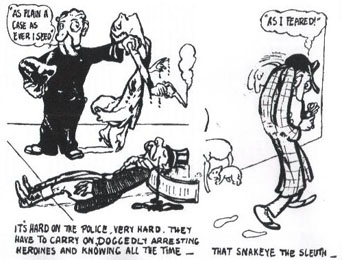
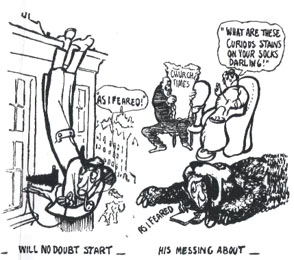
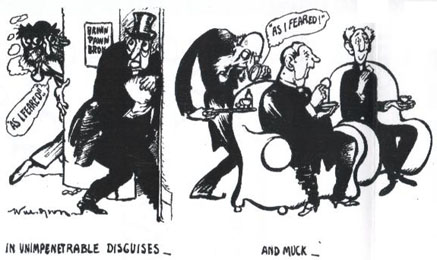
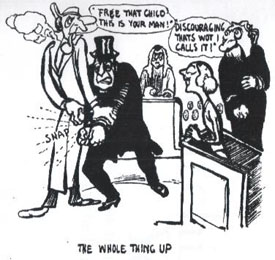
First published in The Herald, 15 May 1926
Thomas Keneally's The Commonwealth of Thieves is reviewed this week in "The Telegraph" by Saul David: "It is an incredible tale, but one generally told from the perspective of the white settlers. Thomas Keneally redresses the balance by also recording the disastrous impact the settlement had on the Aborigines...This is a fascinating study of a unique social experiment. If Keneally relies a little too much on published sources, he more than makes up for it with the felicity of his prose and the broadness of his perspective. The penal colony might have been a success, he reminds us, but for the Aborigines it was a disaster."
Garry Disher continues his run in the US with a review of his novel, Snapshot, in Pennsylvania's "TimesLeader" ("classic police procedural - slogging, methodical investigation set against the backdrop of farm, forest and sea in peninsular Australia"), and one in "The Philadelphia Inquirer" ("The author...has packed this police procedural with the kind of detail that enthralls fans of the genre and with deftly sketched characters. The men are engrossing but largely despicable, the women tougher and for the most part good-natured.")
THE magazine of Australian literature, Australian Book Review, has started a weblog, with its first entry posted yesterday. It was foreshadowed in the August 2006 issue of the magazine, but I didn't think they'd get it up and running so fast. The first entry is written by the magazine's deputy editor, Jo Case, though whether or not she'll remain the sole contributor is yet to be seen.
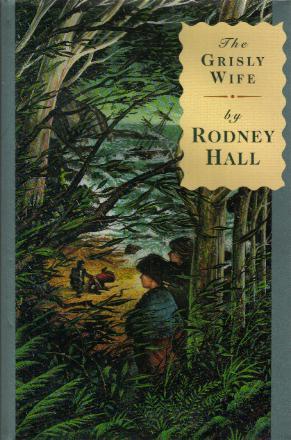
The Grisly Wife by Rodney Hall, 1993
(Macmillan 1993 edition)
Cover illustration and design: Keith McEwan Design
The Age
Although not listed as a book review, Peter Craven leads off this week with his thoughts on what it means to be a critic, and his opinions on "good" and "bad" reviews. In the middle of all this he gives his view of a new collection of notorious reviews, Creme de la Phelgm, edited by Angela Bennie who, in her introduction, "suggests that criticism is only the arbitrary and subjective assertion of some pompous individual". Remove the word "pompous" and I'd tend to agree. Craven, on the other hand, tends to have a bit each way: "In fact, in order to review something accurately, with an appropriate registration of your own response, you probably need not to exercise too much control or you will queer your own pitch by dampening your own hyperbole...In other words, to be properly accurate you often need to abandon yourself to your own response because, however much criticism is a discipline (which depends on a knowledge of the form you are evaluating as well as a capacity for discrimination) it is also one kind of writing and, for heaven's sake, you have to go with the flow and not watch yourself too closely."
Following on from this piece by Craven on "negative" reviews we get Aviva Tuffield's review of Tiare by Celestine Hitiura Vaite, which outlines her opinion of the book right up front: "Hold on tight because this reviewer is about to buck a publishing trend. Celestine Hitiura Vaite's Tahitian trilogy -- of which Tiare is the final instalment -- has been picked up by publishers around the globe, selling in the US for a six-figure sum. Clearly there are many people, especially in the publishing world, who appreciate these tales of Polynesian daily life for Materena Mahi, professional cleaner and matriach, and her much-extended family. But I'm not one of them." An opinion that she is rightly entitled to. The question this raises is: does she justify her standpoint? "Many celebrated novels have been written about non-Western societies and in particular about their poorest segments - think, Chinua Achebe or Rohinton Mistry. But Hitiura Vaite's fixation on sexual politics -- 'sexy loving', keeping your man happy and the like -- results in her writing descending into the banal and the vapid." I think she makes her point well enough.
I'm not keen on "negative" reviews, written for the sake of just being derogatory. A reader should tackle a book with the view that the writer set out to achieve something -- determining whether or not they succeeded is the true test. After that, personal preferences come into play.
I'm not a bird-watcher by habit or obsession so I can safely say that spending $625 on a copy of Handbook of Australian, New Zealand & Antarctic Birds. Volume 7: Boatbill to Starlings edited by Peter Higgins, John Peter and Sid Cowling, is not on my horizon. On the other hand, Sean Dooley thinks it's "a fantastic book to dip into". Good enough.
Short notices are given to: Ida Leeson: A Life by Sylvia Martin: "Ida Leeson...was the first woman to be appointed Mitchell librarian...Despite the disjounted chronology, this portrait of a passionate librarian provides an engrossing journey through Leeson's life and times"; One Day in July: Experiencing 7/7 by John Tulloch: "In this book, Tulloch pulls off the tricky feat of combining academic analysis of the media's respnse to the bombings, with a personal account of his frightening experience of the explosion, its aftermath and the media's use of his story"; and Dovetail Road by Graham Kershaw, whose characters are attractively credible, and his plot, with its intimate observations and genial symmetry, always has enough going on to hold your interest".
The Australian
It's non-fiction all the time over at The Oz this week. Debra Adelaide tackles Creme de la Phlegm: Unforgettable Australian Reviews by Angela Bennie. "The suggestion that criticism has degenerated over the decades isn't borne out, given that acrimony prevails right from the start. Nor is it a particularly Australian phenomenon: Bennie cites plenty of evidence from the US, althoug maybe the wider dispersal of criticism in more publishing outlets overseas makes the egotism of the Australian critic appear more prominent." I don't think I'm interested in this book at all.
Shakira Hussein reviews Paul Sheehan's book Girls Like You, which explores "the horrific series of gang rapes committed in Sydney by the Pakistan-born K brothers", and finds it wanting: "Given the total lack of empirical evidence that Muslim men in Australia are any more likely to commit rape than anyone else, Sheehan's willingness to endorse the idea that a Muslim upbringing conditions one to sexual violence is a dangerous and repellent slur. Rapists and their lawyers can be expected to come up with far-fetched explanations for their crimes; the mystery is why Sheehan should choose to join them."
Errol Simper is pleased that Ken Inglis has brought his story about the ABC up-to-date in his new book, Whose ABC?.
Robert Murray is bemused by The Myth of the Great Depression by David Potts: "What will they think of next? Gallipoli, Kokoda, Curtin and Phar Lap are all under attack from revisionists these days. Now here is an old leftie historian saying the 1930s Depression wasn't so bad after all."
Ross Fitzgerald considers John McDouall Stuart much-maligned and an important, but long-forgotten, explorer of this continent in his review of John Bailey's Mr Stuart's Track.
Short notices are given to: Mixed Relations: Asian Aboriginal Contact in Northern Australia by Regina Ganter in whose "widely researched study, the Top End hums with activity"; Mongrel Punts and Hard-Ball Gets: An A-Z of Footy Speak by Paula Hunt and Glenn "the Bolt" Manton: "Footy speak is the closest Australia has to a national lingo, although the more arcane branches remain the reserve of the AFL pundits"; Faith & Duty: The John Anderson Story by Paul Gallagher: "If Paul Gallagher's bio never gets nasty, it's not only because it's authorised: his subject's role as the Nicest Guy in the Room seems genuine."
As Susanne points out in her comment to the href="http://www.middlemiss.org/weblog/archives/matilda/2006/08/first_tuesday_b_1.html">first instalment of this commentary set, the second book for the second program has been decided. It will be Helen Garner's The First Stone. Haven't read that one either.
The shortlists for the 2006 Age Book of the Year Awards have been released.
Non-Fiction
A Trial Separation: Australia and the Decolonisation of Papua New Guinea by Donald Denoon
The Weather Makers: The History and Future of Climate Change by Tim Flannery
Thunder from the Silent Zone: Rethinking China by Paul Monk
Florence Broadhurst: Her Secret and Extraordinary Lives by Helen O'Neill
Velocity: A Memoir by Mandy Sayer
Poetry
The Kindly Ones by Susan Hampton
Friendly Fire by Jennifer Maiden
Biplane Houses by Les Murray
Urban Myths by John Tranter
The Universe Looks Down by Chris Wallace-Crabbe
Fiction
The Resurrectionist by James Bradley
Slow Man by J.M. Coetzee
The Secret River by Kate Grenville
Dead Europe by Christos Tsiolkas
Swallow the Air by Tara June Winch
The prize for each category is $10,000, with a further $10,000 for the Age Book of the Year.
The awards will be announced at the Melbourne Town Hall on Friday August 25th, during the Melbourne Writers' Festival.
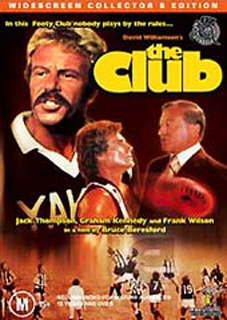
Don's Party 1980
Directed by Bruce Beresford
Screenplay by David Williamson from his own play
Cast: Jack Thompson, Graham Kennedy, Frank Wilson, Harold Hopkins and John Howard.
'Tis the everyday Australian
Has a language of his own,
Has a language, or a slanguage,
Which can simply stand alone.
And a "dickon pitch to kid us"
Is a synonym for "lie",
And to "nark it" means to stop it,
And to "nit it" means to fly.
And a bosom friend's a "cobber,"
And a horse a "prad" or "moke,"
While a casual acquaintance
Is a "joker" or a "bloke."
And his lady-love's his "donah"
Or his "clinah" or his "tart"
Or his "little bit o' muslin,"
As it used to be his "bart."
And his naming of the coinage
Is a mystery to some,
With his "quid" and "half-a-caser"
And his "deener" and his "scrum".
And a "tin-back" is a party
Who's remarkable for luck,
And his food is called his "tucker"
Or his "panem" or his "chuck".
A policeman is a "johnny"
Or a "copman" or a "trap",
And a thing obtained on credit
Is invariably "strap".
A conviction's known as "trouble",
And a gaol is called a "jug",
And a sharper is a "spieler"
And a simpleton's a "tug".
If he hits a man in fighting
That is what he calls a "plug",
If he borrows money from you
He will say he "bit your lug."
And to "shake it" is to steal it,
And to "strike it" is to beg;
And a jest is "poking borac",
And a jester "pulls your leg".
Things are "cronk" when they go wrongly
In the language of the "push",
But when things go as he wants 'em
He declares it is "all cush".
When he's bright he's got a "napper",
And he's "ratty" when he's daft,
And when looking for employment
He is "out o' blooming graft".
And his clothes he calls his "clobber"
Or his "togs", but what of that
When a "castor" or a "kady"
Is the name he gives his hat!
And our undiluted English
Is a fad to which we cling,
But the great Australian slanguage
Is a truly awful thing!
From The Bulletin, 4 June 1898.
Note:This poem was originally published in the Orange Leader (though I am uncertain as to when), and was subsequently also printed with the title "Larrikin Language".
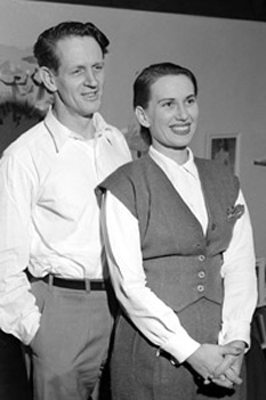
George Johnston and Charmian Clift
As previously mentioned, ABC Television has bitten the bullet and started a monthly book program. As Sir Humphrey Appleby might have said, this is a very brave decision. Such programs do not have a glorious history on Australian television, generally being relegated to graveyard timeslots, or unimaginative in their approach. But with First Tuesday Book Club I think they might just be on a winner.
The ABC was rather restrained in their pre-publicity of the 30-minute show leading up to the first night. There were a couple of judiciously placed news drops in "The Age" newspaper, and a few (say, one or two a night) small promos between programs in the week before the event. If the promotional push extended beyond that I was blissfully ignorant of it. So ABC management were looking optimistic without attempting to be over-confident. Prudent I would have thought.
Luckily enough the program has, as its host, one of Australia's better television performers. Jennifer Byrne has a long history on Australian television, as journalist and presenter, and comes across as informed and enthusiastic. I can forgive a lot of things of people appearing on television but if they don't have either of those attributes then they lose my interest pretty fast. Appearing with Jennifer Byrne were Jason Steger (literary editor of "The Age"), Jacki Weaver (actor and author), Peter Cundall (presenter of ABC TV's Gardening Australia program) and Marieke Hardy (screenwriter,
blogger and grand-daughter of Frank Hardy - about the last of which she seemed quite defensive). It's a good mix of ages and literary backgrounds, though it might be criticised as being overly homogenous in its cultural diversity.
The first thing we notice about the program is the set and the seating arrangements of the participants. Most previous attempts at this have utilised the tried and true, but now tired, approach of putting all panelists in a line behind a straight or slightly curved desk with a fixed camera out front. The problem with this is that the host, who generally sits in the middle, spends the entire program bouncing their head backwards and forwards, making eye-contact with the panellists on each end of the desk, who lean forward attempting to stay in the conversation, producing a weird effect like four people sitting around a noddy-head dog. The dynamic has to be just right or the whole thing falls apart. First Tuesday Book Club gets around this problem by seating all
participants in a circle, just like a normal book club. A simple solution, so simple you wonder why no-one has done it before; until you start wondering how the guy on the middle left is ever going to get into shot if his back is to the camera facing the main talent. That is, of course, until they all come into center screen, one after the other, and you realise the answer is to have one camera focused on each person - five in all. It's a good ploy, just so long as you can hide the cameras in the background. And that's where the second part of the set-up comes in.
The program is presented with five people sitting in a circle in armchairs surrounded by bookshelves. But bookshelves of a specific type. They have been designed in such a way that they complement the light airy nature of the program. The shelves are of light-coloured wood, without backing boards, which carry a number of book-like objects in a general sense of order - standing upright or stacked in short piles on the shelves. I say "book-like" because the objects are book sized and shaped but are covered in what appears to be brown wrapping paper. I'm not doing the set justice here. It sounds awful rom my description, yet the overall effect is one of bookishness without the distractions of a multi-coloured background that draws the eye to the titles and away from the discussion in the centre of the set. So another win there.
As a side-point: I didn't see any of the cameras in the background during the program
so I can only suppose they were cleverly hidden amongst the bookshelves and books. It worked for me.
The choice of the books under discussion each week is going to be the telling point, determining whether or not the programs succeed. This week we had the 2006 Miles Franklin Award winner, The Ballad of Desmond Kale by Roger McDonald, and, as Jennifer Byrne's "classic" choice, American Psycho by Bret Easton Ellis. And if argument, discontent, and enthusiasm are your criteria for success on programs such as this then you got it in bucketloads. The McDonald novel was generally considered to be a worthy read. There were a few dissensions - Peter Cundall found what he thought was a factual error on the first page - which were mainly to do with the style employed and the length. But all things considered it received a positive response.
Not so the Ellis. Byrne picked the book for discussion and she introduced it as "modern classic". Weaver agreed, Steger and Hardy thought it would have made for a good short story and Cundall just about went apoplectic. For a while there I thought he was going to burst a boiler. His final verdict: he had a good use for the novel - chopped up as mulch for his plants. Each book brought out a lively discussion, curtailed somewhat by the program's length, but energetic and relatively free-flowing. Thirty minutes seemed a tad short to me, although sixty might just be stretching the bounds of interest.
All in all it's a good start. I didn't see anything in this first episode that might scuttle it too early in its run. Its continued success will depend largely on the choice of books and whether or not the participants become too repetitive. The books under discussion will hange from week to week, it might be an idea to introduce some guest commentators from time to time as well.
The September program will discuss Shadow of the Wind by Carlos Ruiz Zafón, and one other, yet to be announced.
The Novel of the Soulful Woman.
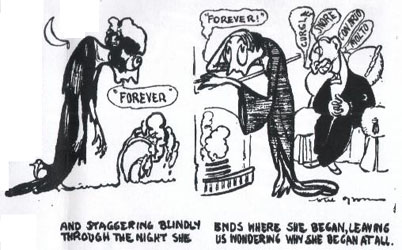
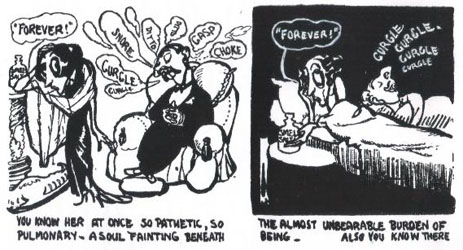
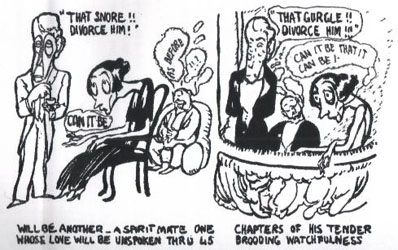
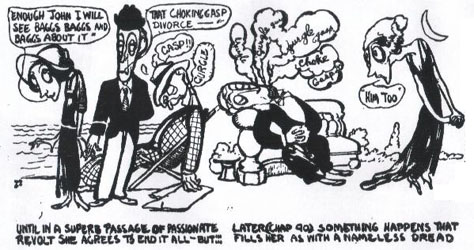
First published in The Herald, 8 May 1926
Best known as an actor, William McInnes received wide-acclaim for his 2005 memoir A Man's Got to Have a Hobby, and is now profiled in "The Age" by Jason Steger on the eve of the publication of his first novel, Cricket Kings. As McInnes puts it: "My old man used to say in cricket you think you're doing nothing and all of a sudden you see someone do something and you certainly work out something about that person. It's a game that teaches you to talk and to listen and to watch."
The winners of 2006 Romance Writers of America Rita awards had been announced, and Marion Lennox, from Ballarat in Victoria, was adjudged the winner in the category of Best Traditional Romance, for her novel Princess of Convenience. This is a major award in the field ranking with Nebula Award, presented by the Science Fiction Writers of America,
and the Edgars, presented by the Mystery Writers of America.
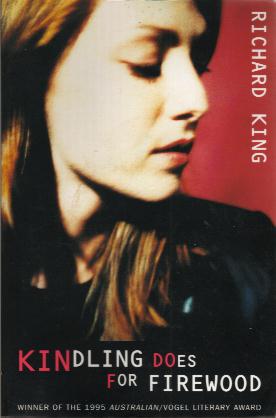
Kindling Does For Firewood by Richard King, 1996
(Allen & Unwin 1996 edition)
Cover: Michael Killalea